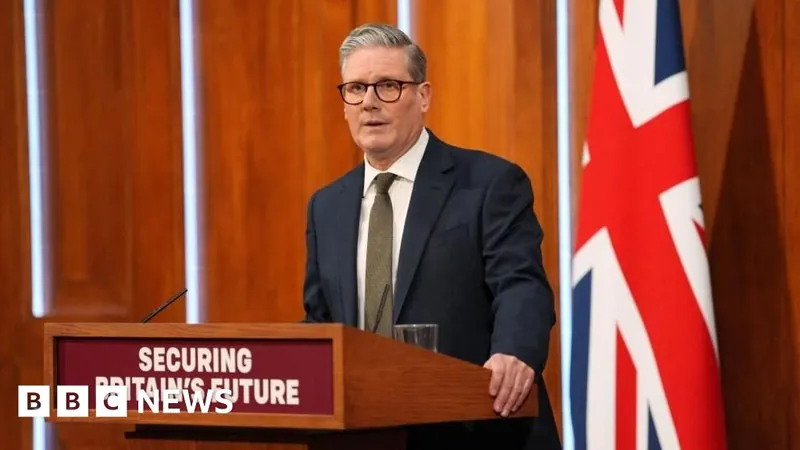
Emergency Action: UK Government Moves to Rescue British Steel from Closure
2025-04-11
Author: Chun
UK Government Takes Bold Steps to Save British Steel
In a dramatic turn of events, the UK government is set to recall Parliament for a rare Saturday session to pass emergency legislation aimed at preventing the imminent closure of British Steel's Scunthorpe plant, a vital hub for the country's steel production.
Sir Keir Starmer has emphasized that this legislation empowers ministers to "take control" of the Lincolnshire site, specifically to halt its Chinese owner, Jingye, from shutting down critical blast furnaces. This could pave the way for future nationalization of the company, allowing the government to explore all available options.
Urgent Measures Amid Looming Financial Crisis
This urgent move follows discussions over the ongoing viability of the plant after Jingye announced that its blast furnaces were "no longer financially sustainable." As MPs and peers return to Westminster—after being on their Easter break—this marks only the fifth Saturday sitting of Parliament since World War II, underscoring the government's commitment to the issue.
Starmer has reiterated the importance of steelmaking to the UK economy, stating, "Jobs, investment, growth—our economic and national security are all on the line." Just days before the emergency session, Jingye, which acquired British Steel in 2020, revealed it has been losing approximately £700,000 a day despite having invested over £1.2 billion to support operations.
New Powers to Keep Production Alive
The new legislation will empower the government to order essential raw materials to sustain the two operational blast furnaces at the Scunthorpe site, as supplies are projected to run out in just a few weeks. Additionally, it will allow ministers to direct company management and protect plant workers who take initiatives to maintain operations against Jingye's directives.
Union Support and Criticism of Government Action
Unions representing British Steel employees have welcomed the government's intervention, with Unite stating it offers a "reprieve" as a long-term solution is sought. General Secretary Sharon Graham remarked, "Ministers could not allow a foundation industry to go under." However, the GMB union viewed this as a preliminary step toward nationalization, claiming it is essential to secure the UK's steel industry.
The Conservative Party's leader, Kemi Badenoch, criticized the government's handling of the crisis, suggesting their late action was a result of prior negligence. Meanwhile, Reform UK leader Nigel Farage claimed this legislation is merely a "short-term sticking plaster," advocating for immediate nationalization of British Steel as the only viable solution to protect this vital industry.
A Matter of National Security
Liberal Democrat leader Sir Ed Davey and the Green Party of England and Wales have also expressed support for nationalization, citing concerns about the UK potentially becoming the only nation in the G7 without primary steelmaking capabilities. Parliament's recall—rarely invoked—has sparked discussions that reach far beyond logistics, tapping into national economic security and industry resilience.
As the House of Commons reconvenes, the stakes could not be higher; how the government navigates this crisis will not only impact the steel industry but will also resonate through UK economic policy for years to come.





 Brasil (PT)
Brasil (PT)
 Canada (EN)
Canada (EN)
 Chile (ES)
Chile (ES)
 Česko (CS)
Česko (CS)
 대한민국 (KO)
대한민국 (KO)
 España (ES)
España (ES)
 France (FR)
France (FR)
 Hong Kong (EN)
Hong Kong (EN)
 Italia (IT)
Italia (IT)
 日本 (JA)
日本 (JA)
 Magyarország (HU)
Magyarország (HU)
 Norge (NO)
Norge (NO)
 Polska (PL)
Polska (PL)
 Schweiz (DE)
Schweiz (DE)
 Singapore (EN)
Singapore (EN)
 Sverige (SV)
Sverige (SV)
 Suomi (FI)
Suomi (FI)
 Türkiye (TR)
Türkiye (TR)
 الإمارات العربية المتحدة (AR)
الإمارات العربية المتحدة (AR)